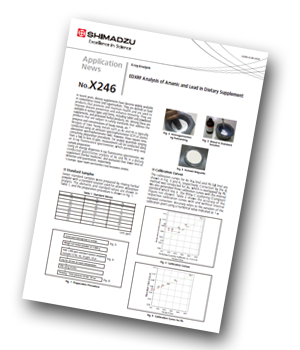Shimadzu has produced an application note describing the EDXRF analysis of arsenic and lead in dietary supplement.
 Introduction
Introduction
In recent years, dietary supplements have become widely available in convenience stores and supermarkets. They are defined as food products that promote and maintain health and are used to improve disease prevention and enhance immunity. They are available in various types and forms, including tablet and powdered supplements, and processed herbal products, etc. Among these are products that are subject to safety standards that address the presence and concentrations of heavy metals, etc. Analysis of toxic heavy metals such as As and Pb is typically conducted using an emission spectrophotometer (ICP) or atomic absorption spectrophotometer (AA), however, these require time consuming preparation procedures. For analyte quantities ranging from a few to tens of ppm, measurement can be conducted using an X-ray fluorescence spectrometer, which permits very easy sample preparation.
Method
In this application, an energy dispersive X-ray fluorescence spectrometer was used to conduct quantitative analysis of As and Pb in a dietary supplement (herbal medicine) and evaluate their lower limit of detection and quantitation, respectively.
Conclusion
The accuracy of the calibration curve indicates that without conducting internal standard correction, accuracy improved 2.6 times for As, and 2.0 times for Pb. The cause is thought that the fluctuation of the RhKαC is added to the fluctuations in the respective intensities of AsKα and PbLβ1.
In contrast, both for As and Pb, the lower limit of detection and lower limit of quantitation are the same for both formed briquette samples and manually compressed samples. The reason for this lack of any substantial difference is thought to be due to a zero net intensity for the blank. Therefore, since either method is valid for measuring dietary supplements, using the pressing sample preparation method without the use of an internal standard or the easy compression (powder) sample preparation method with an internal standard is suitable.
